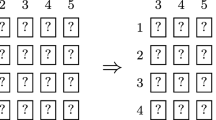Abstract
In March 2023, ChatGPT generated a new puzzle, Sumplete. Sumplete consists of an \(n \times n\) grid, each whose cell has an integer. In addition, each row and column of the grid has an integer, which we call a target value. The goal of Sumplete is to make the sum of integers in each row and column equal to the target value by deleting some integers of the cells. In this paper, we prove that Sumplete is NP-complete and propose a physical zero-knowledge proof for Sumplete. To show the NP-completeness, we give a polynomial reduction from the subset sum problem to Sumplete. In our physical zero-knowledge proof protocol, we use a card protocol that realizes the addition of negative and positive integers using cyclic permutation on a sequence of cards. To keep the solution secret, we use a technique named decoy technique.
Access this chapter
Tax calculation will be finalised at checkout
Purchases are for personal use only
Similar content being viewed by others
Notes
- 1.
This name was also named by ChatGPT [19].
References
Boer, B.: More efficient match-making and satisfiability the five card trick. In: Quisquater, J.-J., Vandewalle, J. (eds.) EUROCRYPT 1989. LNCS, vol. 434, pp. 208–217. Springer, Heidelberg (1990). https://doi.org/10.1007/3-540-46885-4_23
Bultel, X., Dreier, J., Dumas, J., Lafourcade, P.: Physical zero-knowledge proofs for Akari, Takuzu, Kakuro and KenKen. In: FUN, vol. 49, pp. 8:1–8:20 (2016)
Bultel, X., et al.: Physical zero-knowledge proof for Makaro. In: SSS, pp. 111–125 (2018)
Chien, Y., Hon, W.: Cryptographic and physical zero-knowledge proof: from Sudoku to Nonogram. In: FUN, pp. 102–112 (2010)
Crépeau, C., Kilian, J.: Discreet solitary games. In: Stinson, D.R. (ed.) CRYPTO 1993. LNCS, vol. 773, pp. 319–330. Springer, Heidelberg (1994). https://doi.org/10.1007/3-540-48329-2_27
Dumas, J., Lafourcade, P., Miyahara, D., Mizuki, T., Sasaki, T., Sone, H.: Interactive physical zero-knowledge proof for Norinori. In: COCOON, pp. 166–177 (2019)
Goldwasser, S., Micali, S., Rackoff, C.: The knowledge complexity of interactive proof systems. SIAM J. Comput. 18(1), 186–208 (1989)
Gradwohl, R., Naor, M., Pinkas, B., Rothblum, G.N.: Cryptographic and physical zero-knowledge proof systems for solutions of Sudoku puzzles. Theory Comput. Syst. 44(2), 245–268 (2009)
Ishikawa, R., Chida, E., Mizuki, T.: Efficient card-based protocols for generating a hidden random permutation without fixed points. In: UCNC, vol. 9252, pp. 215–226 (2015)
Komano, Y., Mizuki, T.: Card-based zero-knowledge proof protocol for pancake sorting. In: SecITC, pp. 222–239 (2022)
Lafourcade, P., et al.: How to construct physical zero-knowledge proofs for puzzles with a “single loop condition.” Theor. Comput. Sci. 888, 41–55 (2021)
Lafourcade, P., Miyahara, D., Mizuki, T., Sasaki, T., Sone, H.: A physical ZKP for slitherlink: how to perform physical topology-preserving computation. In: ISPEC, pp. 135–151 (2019)
Miyahara, D., Hayashi, Y., Mizuki, T., Sone, H.: Practical card-based implementations of yao’s millionaire protocol. Theor. Comput. Sci. 803, 207–221 (2020)
Miyahara, D., et al.: Card-based ZKP protocols for Takuzu and Juosan. In: FUN, pp. 20:1–20:21 (2021)
Miyahara, D., Sasaki, T., Mizuki, T., Sone, H.: Card-based physical zero-knowledge proof for Kakuro. IEICE Trans. Fundam. Electron. Commun. Comput. Sci. 102-A(9), 1072–1078 (2019)
Mizuki, T., Sone, H.: Six-card secure AND and four-card secure XOR. In: FAW, pp. 358–369 (2009)
Nakai, T., Tokushige, Y., Misawa, Y., Iwamoto, M., Ohta, K.: Efficient card-based cryptographic protocols for millionaires’ problem utilizing private permutations. In: CANS, pp. 500–517 (2016)
OpenAI: GPT-4 technical report (2023)
Penguin, P.: ChatGPT invented its own puzzle game (2023). https://puzzledpenguin.substack.com/p/chatgpt-invented-its-own-puzzle-game
Ruangwises, S.: Two standard decks of playing cards are sufficient for a ZKP for sudoku. New Gener. Comput. 40(1), 49–65 (2022)
Ruangwises, S.: An improved physical ZKP for nonogram and nonogram color. J. Comb. Optim. 45(5), 122 (2023)
Ruangwises, S., Itoh, T.: Securely computing the n-variable equality function with 2n cards. In: TAMC, pp. 25–36 (2020)
Ruangwises, S., Itoh, T.: Physical zero-knowledge proof for Numberlink. In: FUN, vol. 157, pp. 22:1–22:11 (2021)
Ruangwises, S., Itoh, T.: Physical zero-knowledge proof for numberlink puzzle and k vertex-disjoint paths problem. New Gener. Comput. 39(1), 3–17 (2021)
Ruangwises, S., Itoh, T.: Physical zero-knowledge proof for Ripple Effect. In: WALCOM, vol. 12635, pp. 296–307 (2021)
Ruangwises, S., Itoh, T.: How to physically verify a rectangle in a grid: a physical ZKP for shikaku. In: FUN, pp. 24:1–24:12 (2022)
Ruangwises, S., Itoh, T.: Physical ZKP for makaro using a standard deck of cards. In: TAMC, vol. 13571, pp. 43–54 (2022)
Sasaki, T., Miyahara, D., Mizuki, T., Sone, H.: Efficient card-based zero-knowledge proof for sudoku. Theor. Comput. Sci. 839, 135–142 (2020)
Sasaki, T., Mizuki, T., Sone, H.: Card-based zero-knowledge proof for sudoku. In: FUN, vol. 100, pp. 29:1–29:10 (2018)
Shinagawa, K., et al.: Multi-party computation with small shuffle complexity using regular polygon cards. In: ProvSec, pp. 127–146 (2015)
Shinagawa, K., et al.: Card-based protocols using regular polygon cards. IEICE Trans. Fundam. Electron. Commun. Comput. Sci. 100-A(9), 1900–1909 (2017)
Takashima, K., et al.: Card-based protocols for secure ranking computations. Theor. Comput. Sci. 845, 122–135 (2020)
Acknowledgments
This work was supported by JSPS KAKENHI Grant Numbers JP22KJ1362 and JP23KJ0968.
Author information
Authors and Affiliations
Corresponding author
Editor information
Editors and Affiliations
Rights and permissions
Copyright information
© 2024 The Author(s), under exclusive license to Springer Nature Switzerland AG
About this paper
Cite this paper
Hatsugai, K., Asano, K., Abe, Y. (2024). A Physical Zero-Knowledge Proof for Sumplete, a Puzzle Generated by ChatGPT. In: Wu, W., Tong, G. (eds) Computing and Combinatorics. COCOON 2023. Lecture Notes in Computer Science, vol 14422. Springer, Cham. https://doi.org/10.1007/978-3-031-49190-0_29
Download citation
DOI: https://doi.org/10.1007/978-3-031-49190-0_29
Published:
Publisher Name: Springer, Cham
Print ISBN: 978-3-031-49189-4
Online ISBN: 978-3-031-49190-0
eBook Packages: Computer ScienceComputer Science (R0)




